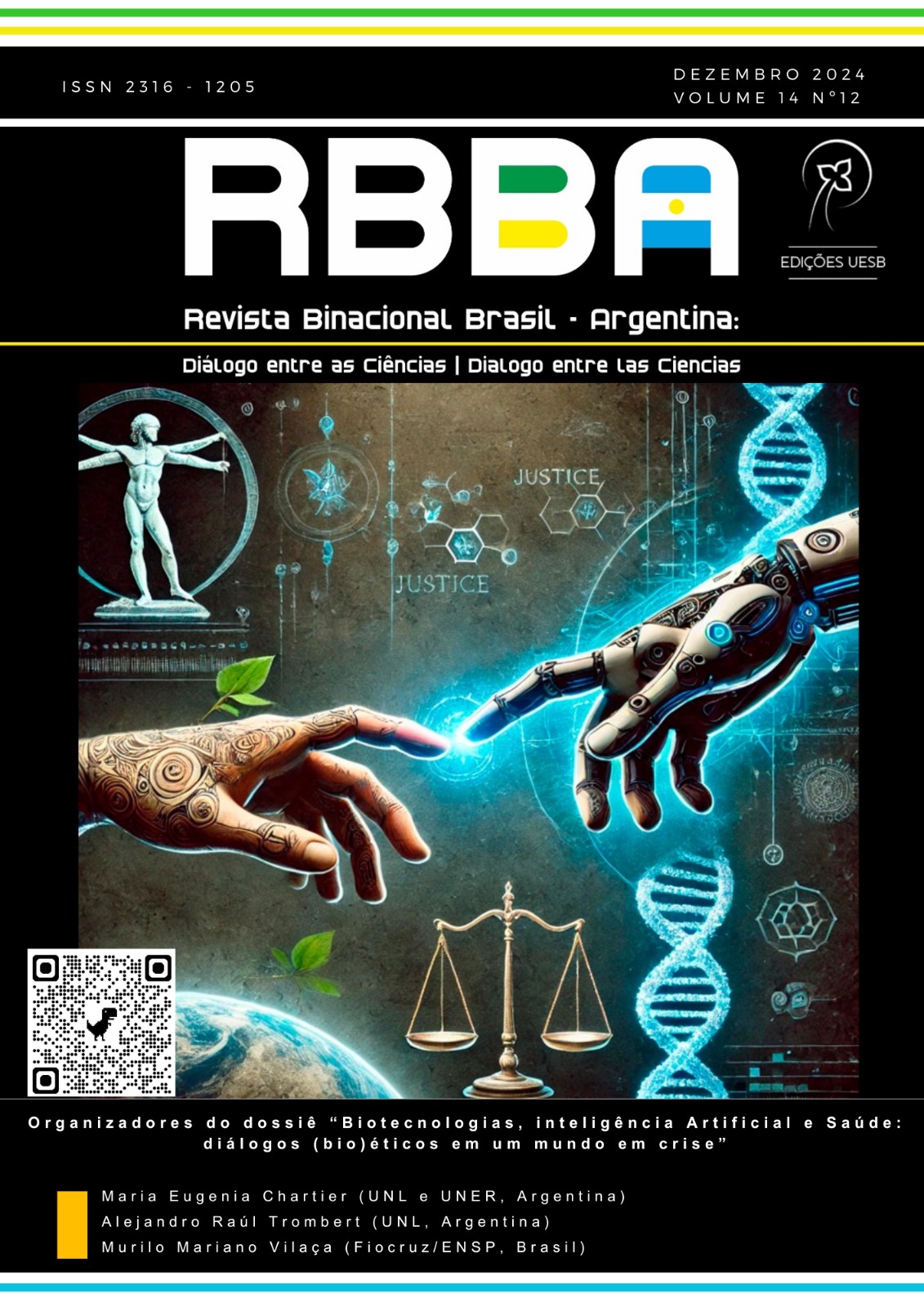Transforming medicine: a critical analysis of the main ethical challenges in the integration of Artificial Intelligence in evidence-based medicine and personalized medicine
DOI:
https://doi.org/10.22481/rbba.v14i2.15571Keywords:
Evidence-Based Medicine, Personalized Medicine, Artificial Intelligence, BioethicsAbstract
Since the late last century, evidence-based medicine (EBM) has become the gold standard in clinical practice, medical training, and health policy development. However, limitations have been identified, leading to the exploration and development of emerging models, including precision medicine (or personalized medicine). Artificial intelligence (AI) has the potential to significantly transform both EBM and personalized medicine. This paper analyses the ethical considerations posed by the use of AI within the framework of EBM and personalized medicine. The issues of bias and their relationship to the principle of equity, the possibility of discrimination, and transparency and explainability closely associated with the opacity of the algorithmic black box will be analysed first. Subsequently, the problems related to data privacy and security, as well as the responsibility surrounding AI-driven decisions and professional autonomy, will be discussed. Finally, the issues linked to equity in access, informed consent, and the ethical use of genetic information will be examined.
Downloads
References
ALOWAIS, S.A., ALGHAMDI, S.S., ALSUHEBANY, N. et al. Revolutionizing healthcare: the role of artificial intelligence in clinical practice. BMC Med Educ v. 23, n. 689, 2023. https://doi.org/10.1186/s12909-023-04698-z
AMANN, J., BLASIMME, A., VAYENA, E. et al. Explainability for artificial intelligence in healthcare: a multidisciplinary perspective. BMC Med Inform Decis Mak v. 20, n. 310, 2020. https://doi.org/10.1186/s12911-020-01332-6
ASOCIACIÓN MÉDICA MUNDIAL. Declaración de Helsinki de la AMM – Principios éticos para las investigaciones médicas en participantes humanos. 2024. En: https://www.wma.net/es/policies-post/declaracion-de-helsinki-de-la-amm-principios-eticos-para-las-investigaciones-medicas-en-seres-humanos/
CHEN, Xiang. AI in Healthcare: Revolutionizing Diagnosis and Treatment through Machine Learning. MZ Journal of Artificial Intelligence, v. 1, n. 2, 2024. https://mzjournal.com/index.php/MZJAI/article/view/259
DE LECUONA, I. Pautas para evaluar proyectos de investigación e innovación en salud que utilicen tecnologías emergentes y datos personales. Edicions de la Universitat de Barcelona, 2020. En: https://www.bioeticayderecho.ub.edu/sites/default/files/ documents/doc_evaluar-proyectos-salud.pdf
DELPIERRE, C. y LEFÈVRE, T. Precision and personalized medicine: What their current definition says and silences about the model of health they promote. Implication for the development of personalized health. Front. Sociol. n. 8, 2023. doi:10.3389/fsoc.2023.1112159
FEINSTEIN, A.R.; RALPH I HORWITZ, R.I. Problems in the “Evidence” of “Evidence-Based Medicine”. The American Journal of Medicine v.103, n. 6, p. 529-535, December 1997.
FULFORD, K. B. Ten Principles of Values-Based Medicine (VBM). En: Schramme T. y Thome J. Philosophy and Psychiatry. De Gruyter, 2012. Cap., p. 50-82.
HAENLEIN, M. y KAPLAN, A. A Brief History of Artificial Intelligence: On the Past, Present, and Future of Artificial Intelligence. California Management Review, v. 61, n. 4, p. 5-14, 2019. https://doi.org/10.1177/0008125619864925
JUNQUERA, L. M. et al. Medicina basada en la evidencia (MBE): Ventajas. Rev Esp Cirugía Bucal y Maxilofac, Madrid, v. 25, núm. 5, pág. 265-272, octubre 2003 Disponible en: http://scielo.isciii.es/scielo.php?script=sci_arttext&pid=S1130-05582003000500003&lng= es&nrm=iso
KUMAR, P.; CHAUHAN, S.; KUMAR AWASTHI, L. Artificial Intelligence in Healthcare: Review, Ethics, Trust Challenges & Future Research Directions. Engineering Applications of Artificial Intelligence, v. 120, 2023, https://doi.org/10.1016/j.engappai.2023.105894
PARLAMENTO EUROPEO. Reglamento (UE) 2024/1689 del Parlamento Europeo y del Consejo, 13 de junio de 2024. Normas armonizadas en materia de inteligencia artificial. https://eur-lex.europa.eu/legal-content/ES/TXT/?uri=CELEX:32024R1689
RATWANI, R.M.; SUTTON, K.; GALARRAGA, J.E. Addressing AI Algorithmic Bias in Health Care. JAMA. v.332, n. 13, p.1051-1052, 2024. doi:10.1001/jama.2024.13486
RUSSELL S. y NORVIG P. Artificial Intelligence: A Modern Approach (4th ed.). Pearson, 2020.
SADEE, W.; WANG, D.; HARTMANN, K. y EWART TOLAND, A. Pharmacogenomics: Driving Personalized Medicine. Pharmacological Reviews, v. 75, n. 4, p. 789-814; 2023. DOI: https://doi.org/10.1124/pharmrev.122.000810
SAHAMA, T.; SIMPSON, L. y LANE, B. Security and Privacy in eHealth: Is it possible?, IEEE 15th International Conference on e-Health Networking, Applications and Services (Healthcom 2013), Lisbon, Portugal, p. 249-253, 2013. doi: 10.1109/HealthCom.2013.6720676
SHEIKH, H., PRINS, C., SCHRIJVERS, E. Artificial Intelligence: Definition and Background. In: Mission AI. Research for Policy. Springer, Cham, 2023. Cap. 2, p. 15-41. https://doi.org/10.1007/978-3-031-21448-6_2
SZAJEWSKA, H. Evidence-based medicine and clinical research: both are needed, neither is perfect. Annals of Nutrition and Metabolism, v. 72, n. 3, p. 13-23, 2018.
UDEGBE, F. C.H.; EBULUE, O.R.; EBULUE, CH.CH. y EKESIOBI, CH. S. AI’s impact on Personalized Medicine: tailoring treatments for improved health outcomes. Engineering Science & Technology Journal, v. 5, n. 4, p 1386-1394, 2024. Doi: https://doi.org/10.51594/estj.v5i4.1040.
UNESCO. Recomendación sobre la ética de la inteligencia artificial. 2022. En: https://www.unesco.org/es/articles/recomendacion-sobre-la-etica-de-la-inteligencia-artificial
Downloads
Published
How to Cite
Issue
Section
License
Copyright (c) 2024 Revista Binacional Brasil-Argentina: Dialogue between the sciences

This work is licensed under a Creative Commons Attribution 4.0 International License.






